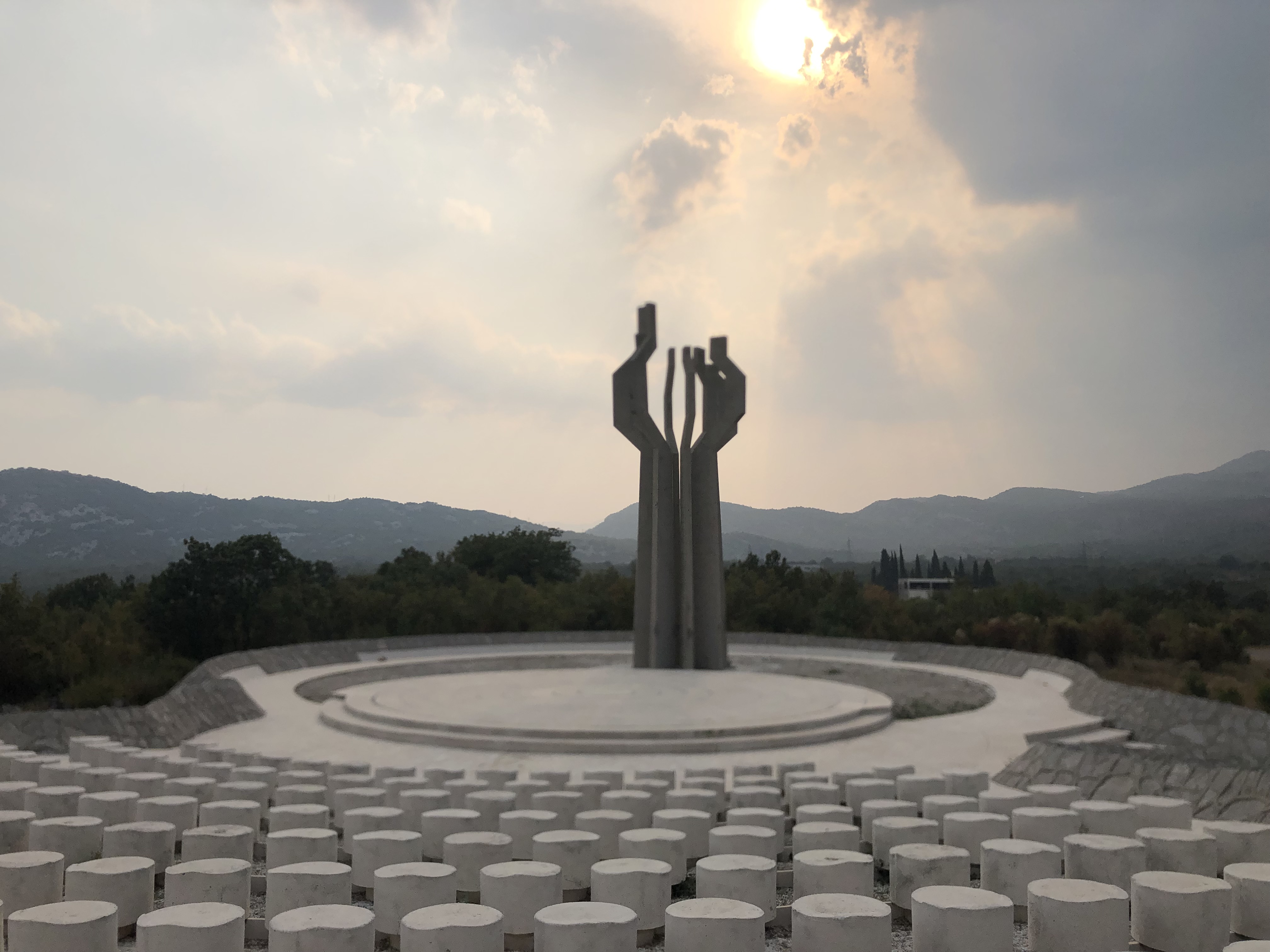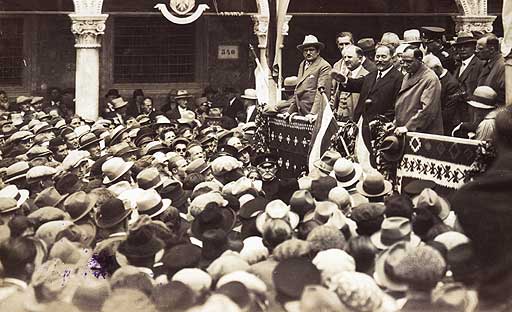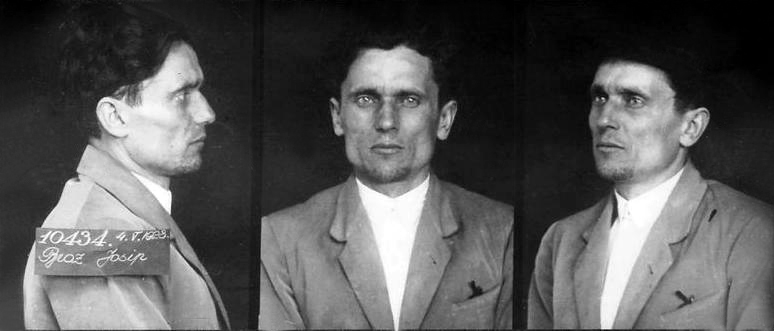|
Zagreb In World War II
When World War II started, Zagreb was the capital of the newly formed autonomous Banovina of Croatia within the Kingdom of Yugoslavia, which remained neutral in the first years of the war. After the Invasion of Yugoslavia by Nazi Germany, Germany and Kingdom of Italy, Italy on 6 April 1941, German troops entered Zagreb on 10 April. On the same day, Slavko Kvaternik, a prominent member of the Ustaše movement, proclaimed the creation of the Independent State of Croatia (NDH), an Axis puppet state, with Zagreb as its capital. Ante Pavelić was proclaimed Poglavnik of the NDH and Zagreb became the center of the Main Ustaša Headquarters, the Government of the Independent State of Croatia, Government of the NDH, and other political and military institutions, as well as the police and intelligence services. Upon the establishment of the NDH, the Ustaše enacted race laws and started persecuting Serbs, History of the Jews in Croatia, Jews, and Romani people in Croatia, Roma. Thousands ... [...More Info...] [...Related Items...] OR: [Wikipedia] [Google] [Baidu] |
Spomenik Streljanje Talaca, Strosmajerov Trg
The authorities of the Socialist Federal Republic of Yugoslavia established many World War II memorials during the country's existence. Several memorial sites were established between 1945 and 1960, though widespread building started after the founding of the Non-Aligned Movement. Yugoslav president Josip Broz Tito commissioned several memorial sites and monuments in the 1960s and 1970s dedicated to World War II battles, and Nazi concentration camp sites. They were designed by notable sculptors, including Dušan Džamonja, Vojin Bakić, Miodrag Živković, Jordan and Iskra Grabul, and architects, including Bogdan Bogdanović, Svetlana Kana Radević and Gradimir Medaković. After Tito's death, a small number were built, and the monuments were popular visitor attractions in the 1980s as patriotic sites, and since the Yugoslav Wars and the dissolution of Yugoslavia, the sites are mostly abandoned. In Slovenia, World War II Veteran Organisation and its branches yearly hold many com ... [...More Info...] [...Related Items...] OR: [Wikipedia] [Google] [Baidu] |
History Of The Jews In Croatia
The history of the Jews in Croatia dates back to at least the 3rd century, although little is known of the community until the 10th and 15th centuries. According to the 1931 census, the community numbered 21,505 members, and it is estimated that on the eve of the Second World War the population was around 25,000 people. Most of the population was murdered during the Holocaust that took place on the territory of the Nazi puppet state called the Independent State of Croatia. After the war, half of the survivors chose to settle in Israel, while an estimated 2,500 members continued to live in Croatia. According to the 2011 census, there were 509 Jews living in Croatia, but that number is believed to exclude those born of mixed marriages or those married to non-Jews. More than 80 percent of the Zagreb Jewish Community were thought to fall in those two categories. Today, Croatia is home to eight synagogues and associated organizations, located in Zagreb, Rijeka, Osijek, Split, Dubro ... [...More Info...] [...Related Items...] OR: [Wikipedia] [Google] [Baidu] |
Croatian Peasant Party
The Croatian Peasant Party (, HSS) is an agrarianism, agrarian List of political parties in Croatia, political party in Croatia founded on 22 December 1904 by Antun Radić, Antun and Stjepan Radić as Croatian Peoples' Peasant Party (HPSS). The Brothers Radić believed that the realization of Croatian statehood was possible within Austria-Hungary, but that it had to be reformed as a Monarchy divided into Trialism in Austria-Hungary, three equal parts – Austria, Hungary and Croatia. After the creation of Kingdom of Yugoslavia in 1918, the Party requested for the Croatian part of the Kingdom to be based on self-determination. This brought them great public support which culminated in 1920 Kingdom of Serbs, Croats and Slovenes Constitutional Assembly election, 1920 parliamentary election when HPSS won all 58 seats assigned to Croatia. In 1920, disgruntled with a bad position of Croats in the Kingdom, the party changed its name into Croatian Republican Peasant Party (HRSS) and sta ... [...More Info...] [...Related Items...] OR: [Wikipedia] [Google] [Baidu] |
Vladko Maček
Vladimir Maček (20 June 1879 – 15 May 1964) was a politician in the Kingdom of Yugoslavia. As a leader of the Croatian Peasant Party (HSS) following the 1928 assassination of Stjepan Radić, Maček had been a leading Croatian political figure until the Invasion of Yugoslavia, Axis invasion of Yugoslavia in 1941. As a leader of the HSS, Maček played a key role in establishment of the Banovina of Croatia, an autonomous Subdivisions of the Kingdom of Yugoslavia#Banates (banovinas) (1929–1941), banovina in Yugoslavia in 1939. Early life Maček was born in Kupinec near Jastrebarsko, southwest of Zagreb. His father Ivan was a Slovenes, Slovene, originally from Lesično, and his mother Ida was of mixed Croats, Croatian, on her father's side, and Polish people, Polish descent on her mother's. At the age of six, Maček started attending elementary school in Kupinec, but continued his education in Zagreb, as his father, a public employee, was transferred there. In Zagreb, Maček en ... [...More Info...] [...Related Items...] OR: [Wikipedia] [Google] [Baidu] |
Cvetković–Maček Agreement
The Cvetković–Maček Agreement ( sh-Latn-Cyrl, Sporazum Cvetković-Maček, Споразум Цветковић-Мачек), also known simply as the Sporazum in English-language histories, was a political compromise on internal divisions in the Kingdom of Yugoslavia. It was settled on August 26, 1939, by Prime Minister of Yugoslavia , Yugoslav prime minister Dragiša Cvetković (an ethnic Serb) and by Vladko Maček (a Croat politician) The agreement established the Banovina of Croatia, with boundaries drawn to include as many ethnic Croats as possible. This effectively created within unitary state, unitary Yugoslavia an autonomous region, autonomous Croatian sub-state, a demand of Croat politicians since the Formation of Yugoslavia , 1918 founding of the Kingdom of Serbs, Croats and Slovenes (Yugoslavia). The Banovina later provided a model for eventual Post WWII, post-war constitutional arrangements in Democratic Federal Yugoslavia , Federal Yugoslavia (1943–1945). Backgr ... [...More Info...] [...Related Items...] OR: [Wikipedia] [Google] [Baidu] |
Order Of The People's Hero
The Order of the People's Hero or the Order of the National Hero ( sh-Latn-Cyrl, separator=" / ", Orden narodnog heroja, Oрден народног хероја; , ), was a Socialist Federal Republic of Yugoslavia, Yugoslav gallantry medal, the second highest military award, and third overall Orders, decorations, and medals of the Socialist Federal Republic of Yugoslavia, Yugoslav decoration.Orders and Decorations of the Socialist Federal Republic of Yugoslavia, 1945–90 by Lukasz Gaszewski 2000, 2003 It was awarded to individuals, military units, political and other organisations who distinguished themselves by extraordinary heroic deeds during war and in peacetime. The recipients were thereafter known as People's Heroes of Yugoslavia or National Heroes of Yugoslavia. The vast majo ... [...More Info...] [...Related Items...] OR: [Wikipedia] [Google] [Baidu] |
Josip Broz Tito
Josip Broz ( sh-Cyrl, Јосип Броз, ; 7 May 1892 – 4 May 1980), commonly known as Tito ( ; , ), was a Yugoslavia, Yugoslav communist revolutionary and politician who served in various positions of national leadership from 1943 until his death in 1980. During World War II, he led the Yugoslav Partisans, often regarded as the most effective Resistance during World War II, resistance movement in German-occupied Europe. Following Yugoslavia's liberation in 1945, he served as its Prime Minister of Yugoslavia, prime minister from 1945 to 1963, and President of Yugoslavia, president from 1953 until his death in 1980. The political ideology and policies promulgated by Tito are known as Titoism. Tito was born to a Croat father and a Slovene mother in Kumrovec in what was then Austria-Hungary. Drafted into military service, he distinguished himself, becoming the youngest sergeant major in the Austro-Hungarian Army of that time. After being seriously wounded and captured by th ... [...More Info...] [...Related Items...] OR: [Wikipedia] [Google] [Baidu] |
President Of Yugoslavia
The president of the Socialist Federal Republic of Yugoslavia was the head of state of that country from 14 January 1953 to 4 May 1980. Josip Broz Tito was the only person to occupy the office. Tito was also concurrently President of the League of Communists of Yugoslavia. Tito was eventually declared president for life and with his death in 1980 the office was discontinued and the new office of President of the Presidency of Yugoslavia took its place. The 1946 Yugoslav Constitution, 1946 constitution defined the government of Yugoslavia headed by a president (commonly known as prime minister) as the highest administrative authority in the country. Tito served as Prime Minister during the entire period up to adoption of the 1953 Yugoslav Constitution, 1953 constitution. This law proclaimed the country to be a socialist republic and removed all previous references to a government, ministries, etc. Instead it defined the office of president and the Federal Executive Council (Yugos ... [...More Info...] [...Related Items...] OR: [Wikipedia] [Google] [Baidu] |
Yugoslav Partisans
The Yugoslav Partisans,Serbo-Croatian, Macedonian language, Macedonian, and Slovene language, Slovene: , officially the National Liberation Army and Partisan Detachments of Yugoslavia sh-Latn-Cyrl, Narodnooslobodilačka vojska i partizanski odredi Jugoslavije (NOV i POJ), Народноослободилачка војска и партизански одреди Југославије (НОВ и ПОЈ); ; (often shortened as the National Liberation Army sh-Latn-Cyrl, Narodnooslobodilačka vojska (NOV), Народноослободилачка војска (НОВ); ; ) was the Communist Party of Yugoslavia, communist-led Anti-fascism, anti-fascist resistance to the Axis powers (chiefly Nazi Germany) in occupied Yugoslavia during World War II. Led by Josip Broz Tito, the Partisans are considered to be Europe's most effective anti-Axis powers, Axis Resistance during World War II, resistance movement during World War II. Primarily a Guerrilla warfare, guerrilla force at its ince ... [...More Info...] [...Related Items...] OR: [Wikipedia] [Google] [Baidu] |
Bombing Of Zagreb In World War II
The bombing of Zagreb in World War II was carried out by the Allies from 1944 until 1945. According to a 1950 census of war victims, a total of 327 people were killed by bombing. Over the course of the bombing, the areas of Črnomerec, Borongaj and Pleso were hit the hardest. Borongaj was targeted as a location of a military airfield. On February 22, 1944, a Dominican monastery was hit by the bombing, resulting in the deaths of eight theology students. In response to these deaths, archbishop of Zagreb Aloysius Stepinac sent a letter to the British ambassador to the Holy See. On May 30, 1944, 100 bombs were dropped on Borongaj, each weighing 250 kg. In 2007 and 2008, unexploded ordnance was found in Maksimir during construction. In 2008 a bomb was found in the nearby town of Sveta Nedelja. Timeline *February 22, 1944 – Fifteenth Air Force attacked.Kit C Carter, Robert Mueller, ''The Army Air Forces in World War II: Combat Chronology, 1941–1945''. DIANE Publishing, ... [...More Info...] [...Related Items...] OR: [Wikipedia] [Google] [Baidu] |
Communist Party Of Yugoslavia
The League of Communists of Yugoslavia, known until 1952 as the Communist Party of Yugoslavia, was the founding and ruling party of SFR Yugoslavia. It was formed in 1919 as the main communist opposition party in the Kingdom of Serbs, Croats and Slovenes and after its initial successes in the elections, it was proscribed by the royal government and was at times harshly and violently suppressed. It remained an illegal underground group until World War II when, after the invasion of Yugoslavia in 1941, the military arm of the party, the Yugoslav Partisans, became embroiled in a bloody civil war and defeated the Axis powers and their local auxiliaries. After the liberation from foreign occupation in 1945, the party consolidated its power and established a one-party state, which existed in that form of government until 1990, a year prior to the start of the Yugoslav Wars and breakup of Yugoslavia. The party, which was led by Josip Broz Tito from 1937 to 1980, was the first communi ... [...More Info...] [...Related Items...] OR: [Wikipedia] [Google] [Baidu] |






